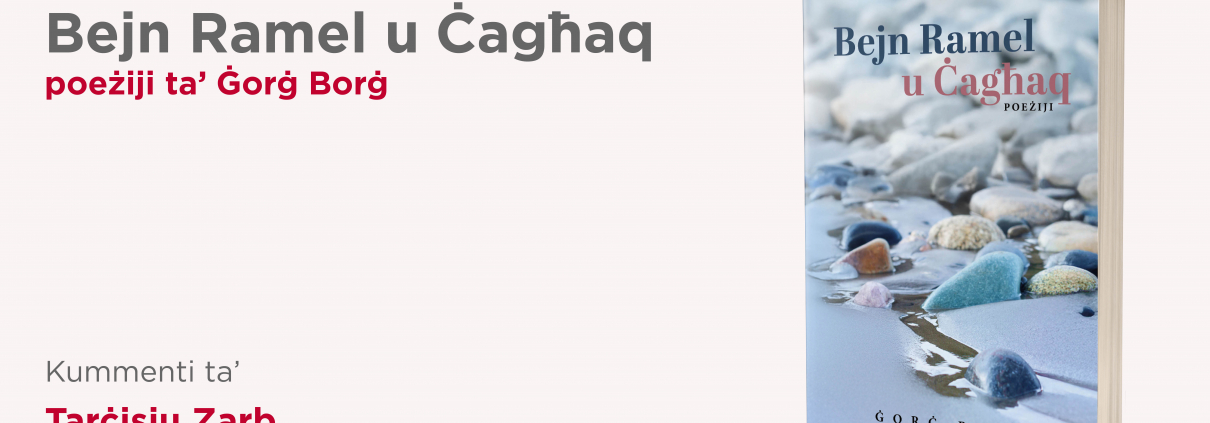Kumment ta’ Tarċisju Zarb
Jinħass li għal din il-vuċi poetika, il-poeżija hija intimitajiet istantanji, li jingħataw vuċi permezz ta’ lsien, li ngħidulu Malti, u li fil-qofol tiegħu huwa jagħmel dak kollu b’mod sintetiku. Għaldaqstant, aktarx iva milli le, il-poeżija ta’ Borg m’hijiex sintattikament jew ritrattistikament iffullata, jew densa, imma, hija fil-forma ta’ ritratti uniċi, li aktarx iva milli le, qegħdin hemm biex permezz tal-analoġija, il-metafora u aspetti retoriċi oħra ta’ tixbih iwassal xi tip ta’ dehra. Ħass. Emozzjoni. Forma mentis. Flimkien, għaldaqstant, dawn il-poeżiji ta’ Ġorġ Borg, hawnhekk mgħammda bħala dawk li jinsabu bejn ir-ramel u ċ-ċagħaq, b’dak kollu li jikkonnotaw dawn iż-żewġ materji, joffru lilu u lilna l-qarrejja tagħhom, b’xi tip ta’ leħħ filosofiku, spiritwali, emozzjonali jew/u konjittiv.
Il-vuċi poetika li nssieħbu magħha f’dawn il-linji, hi vuċi poetika, li llum il-ġurnata tista’ tintqies bħala li hija sintomatika tal-istess Ġorġ Borġ. Fiha r-ritmiċità u l-parallelilità tagħha. Fiha il-persona/ae tagħha, li jinstemgħu jiddeliberaw dwar il-fenomenoloġija-ħajja, u kif din tinstema’ tithwieden fil-qiegħ subkonjuż-konxju tal-poeta. B’dan il-mod aħna nkunu f’qagħda li nkunu nistgħu nisimgħu xi ftit minn dawn l-ilħna, li jwasslulna xi tip ta’ riflessjoni, perċezzjoni, qagħda mentali, filosofija dwar il-ħajja, li fl-istess qosor tagħha, tiġbor f’sinteżi l-fenomenu-ħajja. Dak il-fenomenu li għaddej il-ħin kollu quddiemna u madwarna, u wisq aktar ġewwa fina, hekk kif il-ħsieb jgħadd jitħsieħeb bejnu u bejn ruħu biex jipprova jifhem xi ftit minn dal-fenomenu li ngħidulu ħajja.
U dawn t’hawnhekk huma xi ftit minn dawn il-‘ħsejjes intimistiċi’, tal-poeta, li jitfgħu dawl fuq qiegħ-qiegħu, fuq l-iventi ta’ moħħ li jsawwar narrattiva b’ ‘kapitli’ minuskuli li jirrakkuntaw ‘kożmoż’, il-kożmoż ta’ ġo fina.
U dan kollu jidher minn dawn l-istanti illuminanti, istanti li kull wieħed jitfa’ dawl fuq ir-retroterra ta’ din il-vuċi poetika għaddejja tpinnen u tittekstja dal-emozzjonijiet, liriċizzjonijiet u konjizzjonijiet li jisparkjaw minn ħin għal ieħor fil-qiegħ nett labirintuż ta’ dinjet il-poeta.
Fil-versi li ġejjin, ngħidu aħna l-vuċi poetika tirrifletti fuq it-tama, u għalkemm aktarx iva milli le, hemm iċ-ċans li norbtu lil-lejl mad-dlam u t-telfa tat-tama, hawnhekk jinħass xort’oħra:
Għad illi l-għabex qiegħed magħna…
(………..)
le, le, m’aħniex se mmewtu t-tama
li l-lejl, b’xi mod, se jkun ħanin.
(Għad illi p. 23)
Min-naħa l-oħra, il-poeta li japprezza l-ħbiberija jħossu bħal qisu tela’ l-ġenna, meta bla mistenni, jiltaqa’ ma’ ħabib antik mill-imgħoddi:
Kien ’il bogħod. Beda jsellimli.
Wara rajtu jitbissimli.
(….)
Qalb ma’ qalb kienet dil-laqgħa.
F’ħin bla ħin. Bla mistennija.
(Ħabib ta’ tfuliti, p. 30)
Jiġu waqtiet madanakollu li l-vuċi poetika tixxennaq għall-katarsi, għat-tindifa, tindifa li tixrob mill-analoġija mal-ħasil ta’ tarbija:
Bħal qisni tarbija:
aħsilni,
libbisni,
wennisni
b’dak dawlek setgħani
għax bih tkun teħlisni
mid-dlam li jrid donnu jiblagħni.
(Bħal tarbija p. 47)
U t-tama tibqa’ minkejja kollox. Hemm f’kull ħaġa li nagħmlu fil-ħajja…f’kull sekonda ta’ ħajjitna, sens ta’ fekondità, u għaldaqstant, il-ħela mhijiex bilfors is-sine-qua-non ta’ kull istant ta’ ħajjitna.
(…..)
Imbagħad leħen donnu jgħidli:
Kull sekonda,
għad li dejjem taf ħajjitha
moribonda,
tista’ tkunlek kemm moħlija,
kem fekonda.
(Is-sekondi p. 55)
U sadattant il-ħajja tibqa’ għaddejja, u tasal saħanistra biex tixrob mill-metafora tat-torri li waqtiet jgħinna biex nogħlew ’il fuq, u drabi oħra biex dak li nkunu ħlomna jispiċċa fix-xejn.
Il-moħħ kultant jeħodna
fejn irid
u nibnu torrijiet
mingħajr taħbit.
Nagħmluhom jilħqu s-sħab
Li jkun għaddej.
U minnhom, ħin bla waqt,
ma jibqa’ xej’.
(Torrijiet p. 65)
U għall-poeta, għal kwalunkkwe poeta, il-kelma hija xi ħaġa ‘sagra’, u għaldaqstant wieħed jista’ jifhem, xi jwassal biex il-poeta jbus il-kelma li tkun spiċċat imkażbra.
Kien hemm xi ħadd
li neżża’ l-kelma,
xeħetha fl-art,
każbarha,
u wara
kiesaħ u biered telaq
daqskieku xejn ma ġara.
U jien xħin rajtha
Tbaxxejt u ġbartha,
Mit-trab farfartha
U mbagħad kif stajt libbistha.
U biex nagħmlilha l-qalb
Għannaqtha u bistha.
(Il-kelma mneżżgħa p. 81)
U l-illuminazzjoni, il-waqt epifaniku, taf hija wkoll lill-poeta, li hekk, għal mument uniku, iħossu bħal qisu ttrasfigurat u mdawwal b’dawl li jsostni u jibni.
Kun af li jista’ jkollok
mument illuminat
li jasal bla mistenni
fil-moħħ li jkun strumblat.
U dak il-ħin titkeċċa d-dalma
u ssib li l-moħħ ikun ikkalma.
(Mument illuminat p. 101)
U ma jistax jonqos li fil-kredu poetiku ma tidħolx il-fidwa – ir-redenzjoni – il-poeta li jħossu qiegħed jinfeda, hawnhekk immetaforizzat permezz tal-weraq ta’ siġret l-istess ħajtu.
F’telqa ta’ sajf mill-eqqel
f’xi waħda mill-għodwiet
taf tasal żiffa friska
li tilħaq ħelu ħelu
xi werqiet:
werqiet minn siġret ħajti
li jistennew dak il-mument
li fih iħossu ’l min jifdihom
imqar jekk biss b’xi moviment.
(Żiffa friska, p. 114)
Minn dan kollu naraw li għal Ġorġ Borg hija poeżija ta’ istantanjetajiet miktuba bi stil konċiż u dirett, profond u filosofiku, stimulanti u penetranti, li darba waħda l-qarrej jiltaqa’ mal-intuwizzjonijiet li jitberrhu bejn il-linji, jibqa’ jirreżona f’moħħu u ħsibijietu għal żmien twil. B’dan il-mod kontenut u forma jintħietu ma’ xulxin biex iwasslulna poetiċità unika ta’ poeta, li llum il-ġurnata jintqies bħala wieħed mill-poeti ewlenin ta’ gżiritna. Il-paċi miegħek. Miegħek ukoll.


